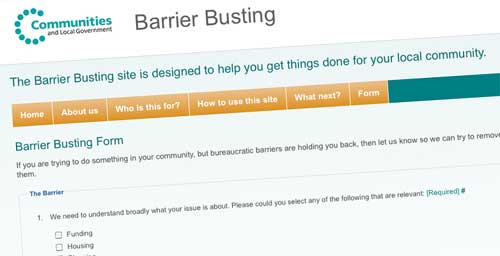
Just a quick post to record that Communities and Local Government have launched what I believe is their first WordPress-based project: Barrier Busting. Based – apparently – on something originally done by BIS, although I don’t immediately recognise it, it’s a fairly modest site built around a one-page survey form, asking people about the ‘bureaucratic barriers’ preventing them doing something in their community.
By the look of it, the form – and the processing code behind it – is hard-coded PHP, dropped into a WordPress custom page template. It’s quite a nice reminder that WordPress itself isn’t the end of the possibilities: by definition, if you’ve got WordPress installed, you’ve got PHP installed, and you can code whatever you like around the standard WordPress theme code. The work has been done by Lancaster-based Netfundi, who have a well-established relationship with DCLG.
Responses
Well, it’s quite nice of them to credit BIS really – looks like maybe it has some distant heritage in http://sandbox.bis.gov.uk/sandbox/2009/12/clean-home-digital-britain/ but it is very distant if so.
As you say, three cheers, and all that.
Re: hard-coded PHP form processing, I did the same thing for the Law Commission’s 11th Programme of Law Reform Consultation earlier this year.
After being frustrated by trying to embed Lime Survey, and tearing out what little hair remains attempting to get CForms II to behave, I ended up going the hand coded route with php in a theme template page.
I still managed to add a little WordPress magic by making it a multi-page form with save and restore!
Yeah – form processing is when I’ve usually felt the need to break out the hand-crafted PHP code. To be honest, WordPress handles everything else so much better than I ever could.
I see Automattic have just updated their contact form plugin (Grunion) – and at first glance, it’s excellent: very easy form creator, built neatly into the WP admin interface as a custom post type (‘Feedbacks’ – ouch). But I doubt it’ll do everything you could ever want from a form, so it isn’t the death of hand-coding just yet.
I’m not using it on here yet; but I’ll probably switch to it over the holidays.